#laterano
Text
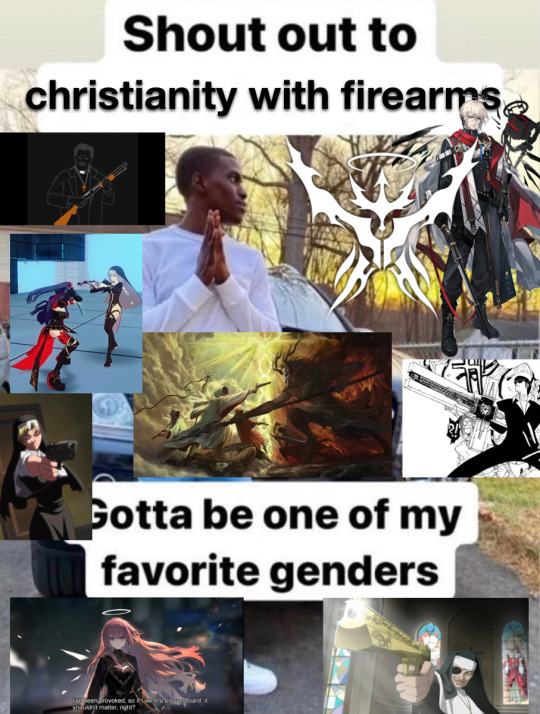
‘’I cast thee 9mm’’
#arknights#arknight executor#arknights laterano#laterano#arknights sankta#sankta#lemuen#arknights lemien#lemuen stood up!!#hortus de escapismo#black lagoon#trigun wolfwood#trigun#trimax#trimax wolfwood#nicholas d wolfwood#black lagoon sister yolanda#sister yolanda#black lagoon eda#faith the unholy trinity#father garcia#honkai impact 3rd#honkai kallen#kallen kaslana#the shotgun is a holy weapon no cap#christianity#arknights executor the ex foedere#executor the ex foedere#federico giallo#hypergryph
1K notes
·
View notes
Text
Not sure if anyone’s said this yet but now that we have Laterano events plural I’m fascinated by their (imo) very deliberate choice of protagonists, and there are almost a couple of layers of narrative going on there. I struggle a little figuring out how to get this into words but specifically I think they’re chosen to be people who can carry a narrative without contradicting the orthodox morals of the church. There’s a LOT of vaguely anti-authoritarian rambling below the cut so please kindly bear with me and my English major brain.
I can’t really start there though. One of the reasons this is so brain hurty is how deeply it’s woven into the storyline, so to start, I have to verbalize how Laterano and Arknights writing more generally is different from other, similar settings. Because like, I hear the words “morally negative church in a grimdark setting” and my brain immediately shuts off. Come on, that’s so far beyond low-hanging fruit, if you’ve seen any grimdark setting ever you know exactly what that looks like. And sure, it was fine the first two or three times you saw it, depending on your tolerance for that kinda thing, but it gets boring quick and even when it was new it was kinda uninteresting story-wise. “Religion is always fake because it inspires hope which means everyone who takes meaning from it is either a corrupt grifter or naive and misled” isn’t just edgy nonsense, it’s also basically useless as an actual critique. It tells you absolutely nothing except how to tune out a particular kind of story, and a story that tries to get you to hear less is doing its job wrong.
So, Arknights does something different. Instead of denying the premise of the church entirely, it actually takes it at its word. Laterano is, in almost every definition of the word, a paradise. It is basically unmatched in terms of actual quality of life, with its only competitors being the Durin cities and maybe Aegir, and is worlds apart from now much the rest of Terra sucks. More than that, though, the paradise is specifically tailored to the worldview of a religion with a strong central authority - when I say it takes it at its word, I mean the authoritarian bits too. Laterano is a city that lives in perfect order and peace because everyone follows the law perfectly and they all understand each other and never fight. Empathy is really important for this, as it allows for a believable amount of superhuman societal order. Laterano has very little crime, political drama, or quarrels in general. It’s the promises of a strict higher authority actually taken at face value: everyone follows the rules and that means they have effectively unfettered freedom, because they don’t want to break the rules and therefore they can do anything they want.
Laterano is specifically written to be a believable paradise in a setting that has none, so that when the story then turns around and criticizes that setting, it has significantly more weight. Even when the promises of paradise are taken at face value, there are still issues that cannot be addressed because the system is inherently flawed even in the imaginary scenario where it works. Even worse, the problems that poke holes in the imaginary perfect scenario are the same problems that they face in the real world, like “how do you deal with the interpretation of scriptures” and “hey there’s this racism thing I keep hearing about should we be worried about that or what”. Because of the way this imaginary perfect system works, we then look back on our real world in a new light and understand it a little better. It’s good critique.
Okay so how did we get here and what does this have to do with the protagonists? Well, this starts with Fiametta in Guide Ahead, because she’s a really weird protagonist. This is a cold take at this point but despite being the character on the front of the box, she has very little to actually do with the central conflict of the event. Most of the conflict is handled by Ezell first and Andoain second, and Fiametta mostly putters around putting holes in people until the finale where Andoain receives the answer he’s been looking for, he turns to explain it to the world, and he runs into the only person in the whole of Laterano who does not care about his motivations or his revelation. Her role, in other words, is to replace the climax of Andoain’s story with her own, and in doing so she makes it much harder to actually get a resolution and a meaning out of the story (this should not be taken as a criticism of her character, let me cook). Guide Ahead’s ending is hazy, with only small piecemeal resolutions to its conflicts, and for the longest time that was just the way the event was written and it stood on its own.
But now, Hortus de Escapismo is out and the monkey brain see patterns. Specifically, with the choice of protagonists. Because Executor is definitely different from Fiametta as a protagonist, but there’s one particularly important connection between the two, and that’s that as I mentioned in the beginning, they allow for stories don’t contradict orthodox morality. Fiametta we went over, as she’s uninterested in any of Andoain’s morality and just wants him dead. Executor, though, is purely focused on his mission and views the world through that lens. He only wants to achieve his objective, and while helping the needy is in line with the stated objectives of the church and he does do so when able, it’s secondary to his assigned task. He does change as he gets further into the story, and we’re not gonna ignore that, but we’ll be back to it later. What I mean is more that he is designed as a person who is able to lead a story that doesn’t contradict with the morals of Laterano. He sees the injustice and suffering around him, but that’s not his job, so he doesn’t need to solve it to have a complete story with a happy ending.
This is where it really gets complicated, so I apologize if I don’t explain this very well. I see this as us dealing with multiple layers of fiction: the events of the story, the perspective of the church, and our perspective as readers. Back to the first point - authoritarian institutions almost always use stories to sell people on their brand of order. Simple stories, simple enough that even calling them myths seems like overselling it a little, your “Saint George slays a dragon” kinda thing. This is the point of the second layer, the perspective of the church. I don’t really have an in-world justification for this layer - maybe you could make the argument that it has to do with Law’s perspective on things, but I don’t totally buy that - I think it’s more in a weird narrative transition space for people who don’t read very carefully. Regardless, Fiametta and Executor’s shared indifference to the questionable circumstances surrounding them is designed to let them tell a story to prop up the existing order. Their protagonist status and their missions are specifically constructed to allow them to ignore the suffering around them, and as such ignore the larger questions that might poke holes in the larger order. They’re both playing out the story of Saint George, where they go and find a bad guy and kill them and that’s all there is to it. The story is designed and told specifically for that “that’s all there is to it”.
But, as we said earlier, this is a good critique, and as such it intentionally undercuts this story with the third layer: what we actually see as readers. We are shown the suffering and the injustice, and then get to see our protagonists ignoring that to pursue their goals. This is what gives Guide Ahead’s ending its unique texture, which sets it apart from every other event with a vaguely unresolved ending. We have seen the actual issues with Laterano, and also watched our protagonist explicitly ignore them in favor of her own story. It’s unsatisfying in a way that only really makes sense to me if we as the readers have an understanding of intentional authorship. Whether it be Yvangelista XI or Law or The Actual Real Life Pope, there are issues here that we want to see a resolution to but people are choosing not to address them. Again, it’s good critique. Not only does it push the reader to unpack and understand the actual real-world technique, but it also helps blunt it. You have just seen a plot and protagonist ring uncharacteristically hollow. You then look around to see why that is, and you realize there are many things that should have been resolved that weren’t. The next time you see a story resolve with that same hollow-ness, you know where to look. Surprise! Harry Potter was propaganda the whole time. It’s okay, it was never good, you were just twelve.
I guess the last thing is where we go from here, because Executor’s story breaks this mold somewhat. In Hortus de Escapismo, he has to deal with a mission that isn’t actually bounded by his normal rules, and because of that he actually does have leeway to help the people around him. He starts as someone who is totally mission-focused, but by the end of the event he’s done a total 180 and is blocking Oren’s attack, which makes the mission harder but helps the non-mission-critical civilians of the monastery. He breaks from the rigid thinking of “kill the bad guy and that’s all there is do it”, and gives his attention to the people he isn’t supposed to see. I think this is an indication of the direction we’re going to be headed in the future with Laterano events. The events aren’t going to get better - they’re going to keep being just as morally murky and complicated as in the past - but the characters are going to get better at handling it, and when they do, they’re going to actually start to change things for the better.
Goddamn that was a lot of writing for 1 AM. I still have a. Lot of thoughts on this event with stuff like empathy and Lemuen and Federico being an autistic icon(my beloved) but I’m going to leave things there, I think, because if I write for any longer my phone is going to crash when I try to post this. Anyway if you actually made it to the end thanks for listening to me rambling and I hope that made sense. Cheers.
#arknights#arknights thoughts#hortus de escapismo#laterano#fiametta#executor arknights#I deadass had to ask folks to proofread this one#to make sure I didn’t sound like I didn’t sound off my rocker#also don’t mind my random Harry Potter slander that’s an entirely different rant
323 notes
·
View notes
Text
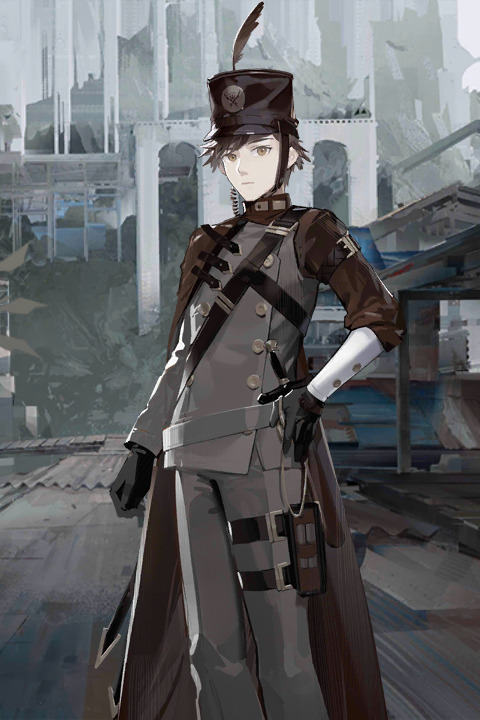

Okay, so. I saw this outfit and immediately thought of Plume.
Then I was reading these lines:

And I thought I would look over her files, just to see if I spotted anything.

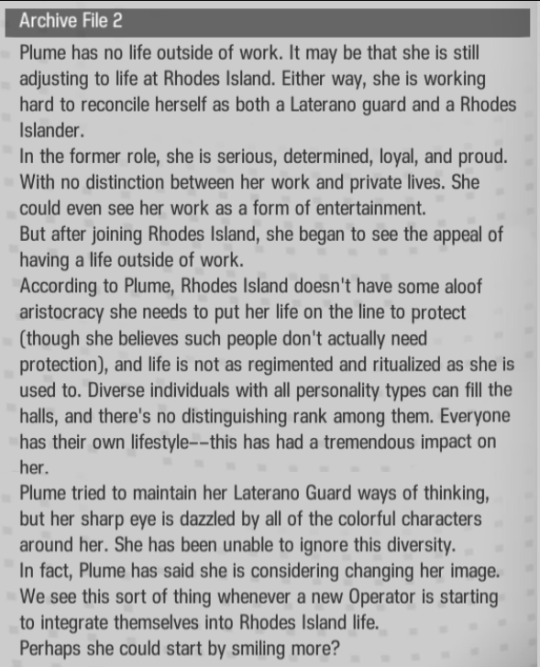
Yeah, this reads differently with a clearer picture of Laterano, and let me just say, It doesn't paint a good picture of Laterano's cultural norms.
The first time I read these files nothing really stuck out to me. It's an insular religious country and she was in the military. Things being regimented and ritualized is to be expected, and so is a general lack of awareness of other cultures. Sure, Plume didn't have a life outside of work, but that's not a particularly rare trait for a person to have.
What I missed the first time, was the references to an "aloof aristocracy", and the general framing of the traits being described not as Plume's but as a Laterano Guard's.
Why learn about the outside world if you're already living in paradise? What other pursuits could be more worthy of your time than defending it?
What I missed the first time, is that Plume is surprised that finding herself surrounded by foreign cultures is "not so bad."
#I don't know if I would call Laterano a distopia because it isn't the government propagandizing people into believing everything's perfect#but damn does it have some deeply rooted societal issues it refuses to acknowledge are a problem#arknights#laterano#hortus de escapismo#plume#ramblings
161 notes
·
View notes
Text
Big fan of the average Laterano being a fucking disaster person that regularly obtains municipal permission to blow shit up for kicks and giggles, big fan of the Laterano body of government being acutely aware that the people need to blow shit up on a regular basis so they don’t become rabid hyenas and start going Yosemite Sam on each other, big fan of the fucked up eldritch entity locked in the Laterano basement actually not being all that fucked up besides being a bit of a control freak but otherwise understanding that people want to blow shit up and more or less arranging things so they do that instead of going Yosemite Sam on each other, but primordially, HUGE fan of Ambriel being considered a weirdo by Laterano standards because she’s too chill and she doesn’t want to blow shit up nor does she go Yosemite Sam on others, she just wants to listen to Lofi Hip Hop Beats To Study while playing Scribblenauts on her Nintendo DS, none of that explosion shit for her.
795 notes
·
View notes
Text
@arkiwii
I wrote some stuff about liberi in Laterano that I don’t know if I’ll include in my fanfic, but I thought you might find interesting.
====
Exusiai rolled her eyes. “No, Laterano doesn’t have laws against miscegenation. Sankta who have children with elders or ancients are as rare as sankta who don’t have children at all.”
She turned to Texas. “Bison wouldn’t seem like such a good idea if you knew for a fact that any kids you had would be born deaf and mute, right?”
The other girls at the table blanched. Sora asked, “Is it really that bad?”
“Our small population isn’t the only reason you see so few sankta outside of Laterano. It’s actually quite scary to leave home and feel like you’ve gone deaf because no one around you is making a ‘sound.’ And at the same time, it’s like no one can really ‘hear’ you either.”
She laughed at herself. “We think we’re ready for it, because Laterano has so many liberi. But it’s not the same at all. We have no idea how much Lateran liberi adapted to live with us until we meet a foreign liberi.”
“Like how?”
“Hmm. I think Lateran liberi make more noise; they talk a little louder, tap their feet, knock on walls. Unless they’re trying to be sneaky, they want to let us know when and where they’re around, without halos. That might be why we sankta started doing the same, to return the courtesy.
“Also, they look you in the eyes more, and make bigger expressions. Big smiles, big frowns, big gestures with their plumage. It’s a big shock to meet the first liberi who doesn’t try at all to let you know how they feel.”
Croissant spoke up. “Y’reckon yer own big smiles were a way of returnin’ courtesy? Instead of relying so much on yer halos that you all end up as flat-faced as Texas?”
Texas reacted not at all, which itself proved the point.
“Huh,” Exusiai said. “It’s weird to think about, but yeah. I suppose that’s possible.”
34 notes
·
View notes
Text



what it's like dating him.
❀. executor's love language is most definitely acts of service!
❀. whenever he goes out on missions, he attempts to complete them in a strictly-set timeframe. not because of whatever reason someone thinks is the case, but because he wants to make the most of the rest of the trip to get you souvenirs; things he thinks you might like.
❀. he's not so big on pda — the most one can get him to tolerate is hand-holding and cheek-kisses in public. however, he tends to be very receptive to affection.
❀. he enjoys being held. he'll curl up into your side when you both lie together, tucked underneath your chin.
❀. he's confident that, even in this position, he can protect you easily.
❀. he's a bit like a cat, honestly. he'll sidle up to you and rest his head on your shoulder, just...soaking in your warmth.
❀. he's the kind of boyfriend to, when you say you're cold, hold your hand and stick it in his coat pocket. of course, if this continues, he'll simply tug you closer so you can leech off his body heat.
❀. no, it's not just an excuse to hug you in public — what are you saying? (it is exactly that.)

💌 a message from tuneseeker! sorry this was done so late! to all the exe likers out there, this one's for you!
#❀. tuneseeker's cries#executor x reader#arknights x reader#navigation tags as follows >#laterano#executor
42 notes
·
View notes
Text

My (first?) contribution to Arknights' 4th Anniversary!
Just another normal day in Laterano, I guess?
#arknights#arknights fanart#arknights 4th anniversary#laterano#executor the ex foedere#executor alter#enforcer arknights#arknights enforcer#insider arknights#arknights insider#ezell pastore#richele colombo#federico giallo#maounosekai
33 notes
·
View notes
Text
How halo-empathy re-contextualizes our Sankta Operators
I'll ignore Ezell (Enforcer) for this post, as we got to know him at the same time as we learned about halo-empathy.
Adnachiel
"In a show of humility, Adnachiel stands helpless in the face of loftier, theoretical topics, though everyone assumes he's just being modest. After all, as soften spoken and kind as he is, Adnachiel gives off the impression of being a clever and considerate young man."
Adnachiel didn't have to deal with that sort of misunderstanding in Laterano, where other Sankta would feel that he isn't being modest when a topic falls outside of his understanding of deterministic, mechanical principles.
On the other hand, he left Laterano before he was the requisite 12 years old for receiving his patron gun. We don't know how long he's lived in virtual exile before he became Infected (and thus exiled for real), but it seems like long enough for him to have adjusted to managing the expectations of non-Sankta.
Of course, that doesn't mean he can stop people from spreading exaggerated rumors about his intelligence and foresight, especially when he's got enough of both in reality.
Probably, his perceptiveness and analysis also helped him adjust to the necessity of watching and listening to other people to guess their state of mind. Philosophical theory is one thing, but facial expressions and vocal tones tend to have clearly observable meanings.
(Though I'm left wondering if his parents lied to him about the reason why they took him away from Laterano as a child. When a potential bully and a potential target both feel each other's emotions, would bullying still happen? Maybe this was an early-writing fluke?)
Arene
Where Adnachiel opened up to other people and studied them in return, Arene displays more introverted, self-focused tendencies.
Arene's troubling lack of sympathy for other people could owe to the several years he's spent exiled from Laterano following his infection with Oripathy, "from an early age". Younger than 12 years old, when Sankta normally receive their patron firearm.
Spending his formative years separated from his parents and surrounded by people from whom he could sense no emotions, with an underdeveloped ability to read emotions normally, and possibly with a unconscious sentiment of Sankta racial superiority, it's perhaps not surprising that Arene displays sadistic, solipsistic tendencies.
His third Archive File further mentions that he "tends to be a little sheepish around some of our other Laterano operators". One assumes this refers to other, unfallen Sankta who not only remind him that other people have internal lives of their own, but that there are some people who can still see right through him.
Ambriel
She's not just evading her taxes; she wanted to live where no one could empathically sense her desire to slack off. Possibly.
For that matter, her choice of weapon not only lets her avoid direct confrontations of a physical, mortal nature… the farther she could deploy from other members of the Lateran Guard or Notarial Hall, the less likely they could see or feel her slacking off.
When the Notarial Hall employed her to watch out for and locate students playing hookie from school, did they hope to inspire her to change by confronting "herself"?
Executor
He and Oren confirm that despite his apparently darkened halo and the unexplained device clamped onto it, he's not fallen. He's very much capable of sensing the feelings of other Sankta. He just doesn't care. Possibly, he thinks that feelings do not change facts, and he bases his decisions on facts.
This does not contradict what he says in his third Trust line. Rather it must mean that when he says, "I cannot understand other people", he cannot understand the reasoning of other Sankta despite knowing their emotional state. His actions could anger another Sankta close enough for him to feel their anger, but he doesn't understand WHY his actions provoked that response.
Exusiai
Texas: "Exusiai is my polar opposite. She seems to get along fine with anyone, but lets very few people close to her."
Exusiai: "Texas is a handful. Even when she lets you close, she won't spare more than a few words. It took me a long time to figure out whether we were cool or not."
Exusiai grew up never needing someone to say more than a few words; she could know how they felt. She had to learn how to read someone as tactiturn as Texas because Sankta don't understand subtler body-language or unspoken words within words. Texas outright tells us that Exusiai finds it very hard to really TRUST other people; Texas had to prove herself through actions because Exusiai can't peek into her mind.
Which makes Exusiai's pledge of loyalty to the Doctor more impactful; even without halo-empathy, she's utterly convinced she understands and agrees with the Doctor. ("Leader… No, savior, I pledge this gun in my hand to protect you until the very end of this world.")
Mostima
This explains so much about Mostima, whom probably already wasn't the most social of Sankta. Before she fell, she had the Sankta empathy to assist her. Fiammetta didn't, but Fiammetta was raised by Sankta and knew how to bridge the gap, so Mostima still didn't have to learn anything. But after she fell, she lost almost all connection to other people that she'd taken for granted, and the effort to reconnect didn't seem worth the trouble.
Exusiai goes crazy not just because Mostima won't use her words to explain, but because words are all Mostima has any more and she was never good with them. Exusiai can't feel Mostima's feelings anymore.
This also brings a new dimension to how the Doctor managed to reach Mostima, and convince her that maybe making new human connections wasn't such a hassle (for her) after all. ("…I see now. When I thought of having a friend like you, the spark of joy I felt wasn't fake after all. Scrap what I said before, Doctor. Maybe I do need a bit of warmth in my life.")
61 notes
·
View notes
Text
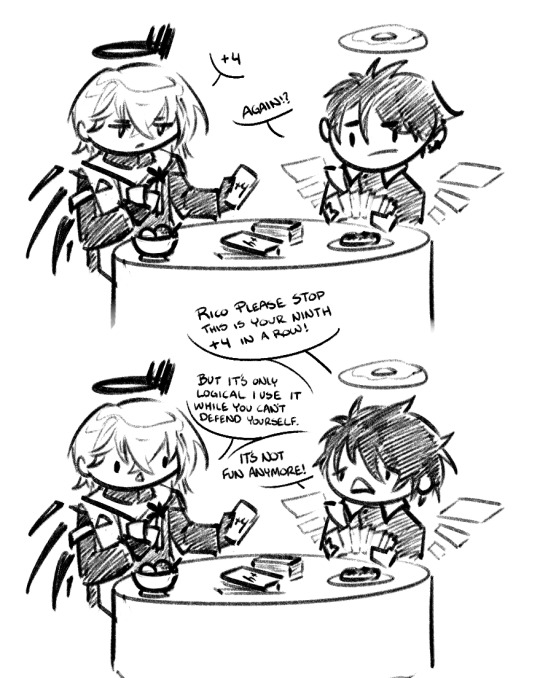
LaterUno
Rico is merciless in the face of sore losers
#Arknights#Arknights Executor#Arknights Insider#Federico Giallo#Richele Colombo#arknights fanart#fan art#Laterano
47 notes
·
View notes
Note
While you are at the sankta post- what is your opinion on the Law? In terms of what it represents thematically and how it actually relates to sankta society (as it was shown so far)?
On what we've been shown so far, to me, The Law is a thematic commentary on the vigilantism and fearmongering that ends up being passed around and encouraged by Christian circles (speaking from the perspective of someone raised in an Evangelical household/community)
Its ever-present presence and immediate consequences immediately make me think of how these kind of circles will attempt to control their members with fear and guilt, by saying that if you do X or Y, you'll be condemned for life unless you repent
How omnipotent it is and how it constantly affects every Sankta, even those who are going outside the norm, also feels close to how it feels to carry those internalized beliefs, even after you've separated from them.
It doesn't matter if you fall, were raised in Iberia, lack a connection or aren't a Sankta--The Law will still find a way to shackle you.
21 notes
·
View notes
Text
When someone referring angel donut himbo with front swept undercut and guns i kept asking


Which one?
#trigun#trigun stampede#vash the stampede#vash saverem#tristamp vash#tristamp#arknights#arknights insider#happy global release day insider#i need them to be put in a room#the notarial hall#laterano#hypergryph#insider#richele colombo#richele is 4cm taller than vash let that sink in
42 notes
·
View notes
Text
So it's basically confirmed that Sankta were just sarkaz that got turned into sankta by the big electronic eldritch cube god BSKDJBKSJDBKLJNSDNLKJSDBKJbKJDBBNSDBKSJDBKJSDBBJNSKJSDBKIJDS
Like we been knew but NOW there's an ANIMATION SHOWING IT
That's INSANE
16 notes
·
View notes
Text
Sure, Laterano may not have been as bad a place as I was expecting, but that is a low bar.
“Love isn’t a crime” is a great line, but the fact that in context it is a radical belief held by an enemy of the state should raise some serious red flags, even without all the other questionable shit.
#to be honest I'm not even fully convinced it isn't exactly as bad as I was expecting#we just haven't really seen much of the place#arknights#guide ahead#laterano#ramblings
117 notes
·
View notes
Text
finally

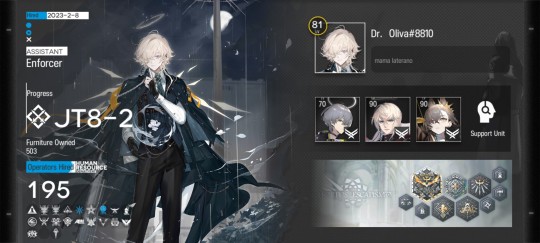
Моя аура излучает силу, потому что я закрывала достижения Hortus не только, чтобы доказать свою любовь к Латерано контенту, но и чтобы закончить оформление своего профиля
11 notes
·
View notes
Text
Inscribed on the entryway to the portico of the Basilica of St. John Lateran in Rome are the words: Mother and head of all the churches in the city and the world.
This inscription may seem wrong at first. Isn’t St. Peter’s Basilica in the Vatican the pope’s main church?
No, not exactly.
The pope serves as the Bishop of Rome and as the Cathedral of the Diocese of Rome, St. John Lateran is the pope’s church.
First dedicated on this day, November 9th, in the year 324, the original basilica was built on land donated to Constantine by the wealthy Lateran family. That structure and its successors suffered fire, earthquake, and the ravages of war, but the Lateran remained the church where popes were consecrated.
In the 14th century, when the papacy returned to Rome from Avignon, the Basilica of St. John Lateran was found in ruins.
Knowing the profound history that occurred there, Pope Innocent X commissioned the present structure in 1646, rebuilding St. John Lateran to its former glory. One of Rome’s most awe-inspiring churches, the Lateran’s towering facade is crowned with 15 colossal statues of Christ, John the Baptist, John the Evangelist, and 12 Doctors of the Church.
San Giovanni in Laterano Rome
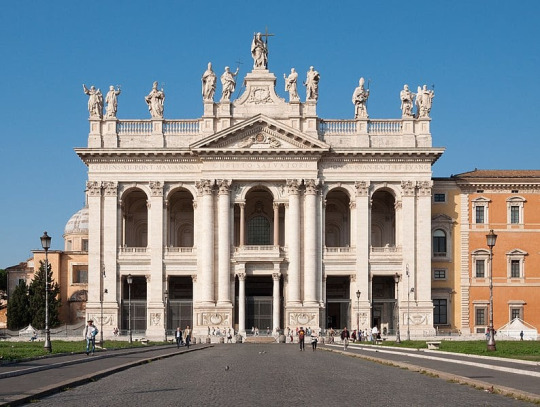
Beneath its high altar rests the remains of the small wooden table on which tradition holds St. Peter himself celebrated Mass.
As Catholics, Rome is the center of our earthly home, the Catholic Church, and we should all foster a feeling of devotion and attachment to the city’s rich and beautiful Catholic heritage! Our Major Basilica Coasters are a unique way to bring the beauty of Rome’s Catholicism into your very own home. Featuring each of the four major basilicas in Rome in a unique ink and watercolor design, these coasters are a thoughtful gift for any lover of Catholic history and art! Get yours today at The Catholic Company!
#The Catholic Company#Catholic#San Giovanni in Laterano Rome#San Giovanni#Laterano#Rome#Laterano Rome#St. PeteR#Tom#TLM
9 notes
·
View notes
